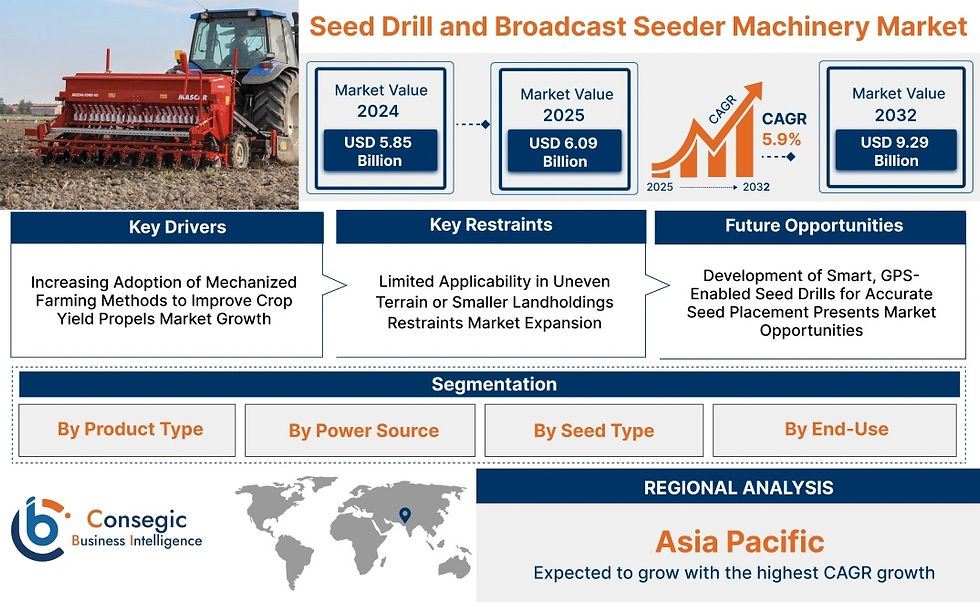Chronic Fatigue Syndrome Market Demand: Future Outlook & Opportunities
- Anurag ConsengicBusinessIntelligence
- Feb 18, 2025
- 4 min read
Chronic Fatigue Syndrome Market Research Report
Introduction:
The Chronic Fatigue Syndrome Market is a complex and evolving segment of the healthcare industry. This report provides a comprehensive analysis of the market, covering its overview, drivers, restraints, opportunities, key players, segmentation, regional analysis, and recent developments.
1. Chronic Fatigue Syndrome Market Overview:
The chronic fatigue syndrome treatment market encompasses the diagnosis, treatment, and management of Chronic Fatigue Syndrome (CFS), also known as Myalgic Encephalomyelitis (ME). CFS is a complex, chronic disease characterized by profound fatigue that is not improved by rest and is worsened by physical or mental activity. The chronic fatigue syndrome market forcastt is influenced by factors such as increasing awareness of the condition, growing research efforts, and the development of new diagnostic and therapeutic approaches. Thechronic fatigue syndrome drug market faces challenges due to the lack of a definitive diagnostic test and the limited availability of effective treatments.
2. Understanding Chronic Fatigue Syndrome:
2.1. What is Chronic Fatigue Syndrome? Chronic Fatigue Syndrome (CFS), also known as Myalgic Encephalomyelitis (ME), is a debilitating multi-system disease that affects millions worldwide. It is characterized by persistent, unexplained fatigue that does not resolve with rest. This fatigue is accompanied by a range of other symptoms, including cognitive dysfunction, sleep disturbances, muscle pain, and post-exertional malaise.
2.2. Symptoms and Diagnosis: Diagnosing CFS is challenging as there is no single definitive test. Diagnosis relies on clinical criteria, including the presence of characteristic symptoms and the exclusion of other medical conditions. Common symptoms include:
Profound fatigue
Post-exertional malaise
Cognitive impairment
Sleep disturbances
Muscle and joint pain
Orthostatic intolerance
2.3. The Burden of CFS: CFS can significantly impact a person's quality of life, affecting their ability to work, attend school, and participate in social activities. The economic burden of chronic fatigue syndrome drug market is substantial, due to lost productivity and healthcare costs.
3. Chronic Fatigue Syndrome Market Drivers:
3.1. Increasing Awareness: Growing awareness of chronic fatigue syndrome therapeutics drug market among healthcare professionals and the general public is driving the market. Increased awareness leads to earlier diagnosis and greater demand for treatment options.
3.2. Growing Research Efforts: Increased research funding and collaborative efforts are focused on understanding the underlying causes of chronic fatigue syndrome therapeutics market and developing effective treatments. This research is driving innovation in the market.
3.3. Need for Effective Treatments: The lack of a cure and the limited availability of effective treatments create a significant unmet need, driving the demand for new therapeutic approaches.
4. Chronic Fatigue Syndrome Market Restraints:
4.1. Lack of Definitive Diagnostic Test: The absence of a definitive diagnostic test makes it challenging to diagnose CFS, leading to delays in treatment and hindering market growth.
4.2. Limited Treatment Options: Currently, there is no cure for CFS, and treatment options are limited, focusing primarily on symptom management. This lack of effective treatments restricts market expansion.
4.3. Heterogeneity of the Condition: CFS presents differently in different individuals, making it difficult to develop standardized treatment protocols.
5. Chronic Fatigue Syndrome Market Opportunities:
5.1. Development of New Therapies: Ongoing research and clinical trials offer the potential for developing new and more effective therapies for CFS, including targeted treatments and disease-modifying agents.
5.2. Improved Diagnostic Tools: The development of improved diagnostic tools, such as biomarkers or objective measures of fatigue, would facilitate earlier and more accurate diagnoses, expanding the market.
5.3. Personalized Medicine Approaches: Personalized medicine, tailored to individual patient characteristics, may improve treatment outcomes and offer new opportunities for market growth.
6. Chronic Fatigue Syndrome Market Key Players:
The Chronic Fatigue Syndrome Market includes various players:
Pharmaceutical companies researching and developing potential treatments.
Diagnostic companies working on developing better diagnostic tools.
Research institutions and academic medical centers conducting clinical trials.
Healthcare providers specializing in the management of CFS.
(Note: Specific key players would require further research using pharmaceutical and healthcare databases.)
7. Chronic Fatigue Syndrome Market Segmentation:
7.1. By Type: Myalgic Encephalomyelitis (ME), Chronic Fatigue Syndrome (CFS)
7.2. By Treatment: Symptom Management, Supportive Care, Emerging Therapies
7.3. By End-User: Hospitals, Clinics, Research Institutions, Home Care Settings
7.4. By Region: North America, Europe, Asia Pacific, Latin America, Middle East & Africa
8. Chronic Fatigue Syndrome Market Regional Analysis:
North America: A significant market due to high awareness and advanced healthcare infrastructure.
Europe: Growing prevalence of CFS and increasing research activities are driving market growth.
Asia Pacific: Increasing awareness and improving healthcare access are creating opportunities in this region.
Latin America, Middle East & Africa: These regions also hold potential for market growth.
9. Chronic Fatigue Syndrome Market Recent Developments:
Recent developments in the Chronic Fatigue Syndrome Market include:
Ongoing clinical trials evaluating the efficacy of new drug candidates.
Research efforts aimed at identifying biomarkers for CFS diagnosis.
Increased focus on personalized medicine approaches.
Growing awareness campaigns to educate healthcare professionals and the public.
10. Future Trends in the Chronic Fatigue Syndrome Market:
Development of more effective treatments and potential disease-modifying therapies.
Improved diagnostic tools and earlier detection of CFS.
Greater understanding of the underlying causes of CFS.
Increased focus on personalized medicine and patient-centered care.
Contact us:
Contact no: (US) (505) 715-4344
Other Related Reports:



Comments